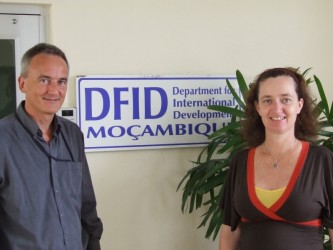In the run up to World AIDS Day - Katie and I, the human development and HIV/AIDS advisers here in DFID Mozambique, thought it would be good to focus on a few of the problems facing Mozambique. Mozambique faces an up hill struggle to develop a health system that can meet the population's essential health needs, at the same time as effectively responding to the challenge of high HIV/AIDS prevalence, even though recent years have seen an impressive growth in the numbers of people who are able to access anti-retroviral treatments. But a bit about us both first...
I (Neil) am now entering my second year here in Mozambique. After the initial struggles learning and communicating in Portuguese, I'm only just becoming comfortable in my role as the focal partner for the health sector, representing the 26 different development agencies that are active in health here.
The move to Mozambique has been made much easier by the obvious attractions of life in Maputo, which has been a great city in its time, as witnessed by the architecture; parks, harbour and coast line, and is rapidly recovering some of that former status. When I lived in Bangladesh, the national tourism campaign slogan was "discover Bangladesh before the tourists do.." - well Mozambique has that feel about it - a fantastic place to be -and not yet attracting the number of visitors its natural beauty and friendly people deserve.
My family settled in quickly, which with 4 children to try to keep happy is a considerable blessing. I have just about been forgiven for dragging my kids around the world and away from newly made friends. We were in Brussels for 3 years before coming to Mozambique, and prior to that had been in Bangladesh, and in the dim and distant past lived in Liverpool, where I was a public health doctor in the National Health Service. We are a long way from Penny Lane (where my son used to go to nursery school), but, if you are familiar with the lyrics of the song - it's in my mind and in my heart...
Having the usual English obsession with the weather, I have to say that the climate in Mozambique, at least so far, has more to recommend it than Bangladesh, Belgium or Britain! But then again, I have yet to experience the terrible floods that regularly affect Mozambique and which climate change is likely to exacerbate.
It has also been good to return to Africa, having been a volunteer (VSO) District Health Officer in neighbouring Malawi in the early 1990's, when Dr. Hastings Kamuzu Banda was still very much in power there. It was particularly nice to find a Malawian in the DFID office and to put my now very rusty Chichewa in to practice after over 15 years. Although I have been working in Public Health, rather than clinical medicine for a number of years, I do still like to get in to the detail of the workings of the hospitals and health facilities, and I was, I suppose, surprised and disappointed to discover that the health resources available to meet Mozambique's health needs are little better now than the conditions that were present in Malawi in the early 1990's. Back then in Malawi, as the District Health Officer for Dowa District, I had been the only doctor for 350,000 people. In Mozambique today, there are still only 874 doctors for a population of over 20 million, and at least 200 of those doctors are Cuban's who have come to help strengthen one of the least well staffed health sectors in the world. But I will get in to the detail of the human resource crisis at later point - as Mozambique has a plan!
Katie Bigmore, my co-blogger, is part of the human development team here in Mozambique, and is the focal partner for the HIV/AIDS common funding mechanism (which basically means the central pot into which all the development partners put their money to be used by the Ministry of Health). Since we are are also the focal partner for the health sector, we have our work cut out in terms of coordinating a huge array of development partners, but we both love a challenge. I will leave Katie to give you her background.
Together, over the coming weeks, we hope to look at health and HIV/AIDS in Mozambique and raise a few questions about what works and what doesn't and what needs to change.


4 comments
Comment by Egidio Vaz posted on
Well done Neil and Katie. Great to see you blogging together. I wish I could have more staff from DFID Mozambique following your footsteps!
I´ll keep an eye on your rwitings.
Best
Egidio.
Comment by Egidio Vaz posted on
But the your question remains unanswered. Will Mozambique ever get the health system its population deserves?
Comment by Neil Squires posted on
Hi Egidio - I am going to sound like a politician in explaining that there is not a simple yes or no answer to the question. The answer is, of course, complicated. I hope to post material in future bloggs which begin to illustrate some of the challenges that Mozambique faces in delivering a health services which meets the needs of the population, but a couple of the biggest challenges to overcome are the lack of health workers, and insufficient and un-predictable financing. More later....
Comment by Gil Lauriciano posted on
Hi Neil and katie
I wonder if you are still in Maputo??? I am doing something on Aid and Domestic Accountability and I picked up the health sector because of the impact of donors there... and I would like to talk to you if that is still possible?????